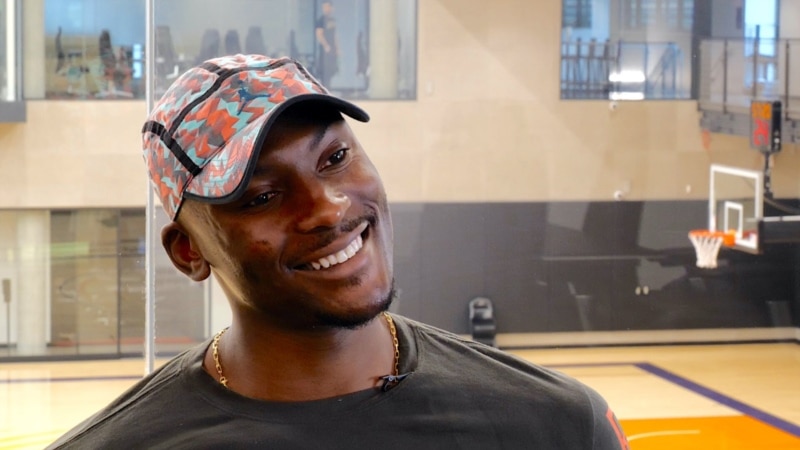From DRC to NBA, Congolese Player Biyombo Gives Others a Shot at Better Life

Growing up in the Democratic Republic of Congo, Bismack Biyombo dreamed of playing professional basketball in the United States. His dream has been reality ever since he was drafted into the NBA more than a decade ago. But what he’s doing off the court gives a notable assist to his home country. The 29-year-old center for Arizona’s Phoenix Suns calls himself “a child of Africa” who “stepped onto a basketball court at the age of 13 in Lubumbashi,” a major city in southeastern DRC. “And I was lucky enough to have, you know, parents that supported me,” he told VOA in an interview at the Suns’ practice facility earlier this spring. Biyombo credits his father Francois Biyombo and mother Françoise Ngoy with nurturing a spirit of purpose and generosity. They sacrificed to ensure that the eldest of their seven children could play basketball, including when he went to Yemen at 16 to try out for a local team, and later when he joined a club league in Spain. After Biyombo was drafted into the NBA in 2011, they encouraged his giving back. He has. Bismack Biyombo has donated time and millions of dollars to support education and health care in the DRC, largely through the self-named foundation he started in 2017 in Florida. (Before joining the Phoenix Suns for the 2021-22 season, he played with the Orlando Magic — also in Florida — as well as the Charlotte Hornets in North Carolina and Toronto Raptors in Canada.) Biyombo heavily funded the Kivu International School, which opened in Goma in 2017. “Each year, we award more than 150 scholarships within the DRC and the U.S.,” he said in a video clip posted on the foundation website. The foundation has brought more than 60 DRC students to the United States to study, he told VOA. Biyombo also hosts free basketball camps each summer in the DRC, equipping youths with new skills, athletic shoes and other gear. “My job becomes to inspire kids across Congo and make sure that we give all of them an equal opportunity,” he said in the VOA interview. Biyombo’s foundation has supported Congolese mobile clinics and upgrades to public health facilities. It also provided hundreds of thousands of dollars’ worth of health care equipment, including face masks and hazmat suits, to help combat the COVID-19 pandemic in the DRC. “And now we've set bigger goals and we're going for it,” Biyombo said. That includes building a Lubumbashi hospital in honor of his father, who died last August at age 61 of complications from COVID-19. Biyombo announced earlier this year that he would donate his salary for the 2021-2022 season — $1.3 million, according to his foundation’s website — toward that mission. “I want to build my dad a hospital that will continue servicing people, because he believed in one guy, which is me,” Biyombo said. “And now we get to do it for him.” Such humanitarian gestures are right out of the playbook of retired NBA great Dikembe Mutombo, a Congolese player who, Biyombo said, is “like a big brother.” Mutombo, who hung up his jersey in 2009 and was inducted into the Basketball Hall of Fame six years later, started a foundation in 1997 to aid people, especially those in his native DRC. That foundation’s projects include building the Biamba Marie Mutombo Hospital in his hometown of Kinshasa. Dr. Joseph Nsambi Bulanda, health minister for Haut Katanga province where Lubumbashi is located, told VOA his government appreciated Biyombo’s offer of a new hospital. Construction has not yet begun. “We can give him some advice,” Nsambi said, noting his government aims “to improve and to let all Congolese and all people from Haut Katanga province have a very good health system.” Nsambi said of Biyombo, “He’s someone with very good will.” He added that the public health system in his country – one of the world’s poorest — welcomes an assist. “We need people. We need organizations.” Biyombo’s generosity has brought him accolades. TIME named him to its 2021 list of Next Generation Leaders. The NBA and health care provider Kaiser Permanente honored him this year with a “community cares” award — and a $10,000 check for his foundation — for his efforts to aid the DRC. The athlete wants others to benefit from basketball, as he has. “So many young African American leaders [are] now coming into the NBA that I think the future of Africa there is great,” Biyombo said. He also talked up the Basketball Africa League, a partnership of the NBA and International Basketball Federation (FIBA). “The reality of the league,” Biyombo said, “is that I think a lot of these kids are given an opportunity to actually stay home” and still prosper in the sport. “You know, most of the kids want to find a way to escape what's happening in Africa,” he said. “And you got to give them a reason to stay. I think that’s one thing that motivated me to invest so much in the younger generation. ... The more tools we can give to the next generation, they'll be able to solve more of the problems that we're dealing with today. “There is an opportunity to make an impact,” Biyombo said. “And I don't want to waste it.” VOA Lingala service’s Eddy Isango contributed to this report.
Most Read